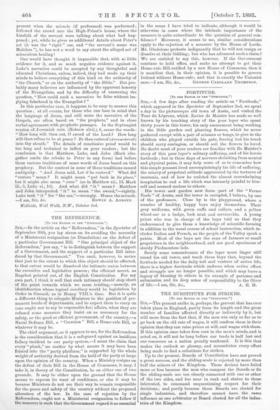FORTITUDE.
[To rim EDITOR OF THE " BraorATov,."] Sin,—A few days after reading the article on " Fortitude," which appeared in the Spectator of September 2nd, we spent a day in the picturesque old town of Aosta, and visited the Tour du Lepreux, which Xavier de Maistre has made so well known by his touching story of the poor leper who spent thirty years in this tower, his only amusement being working in the little garden and planting flowers, which he never gathered except with a pair of scissors or tongs, to give to the children who played outside his gate, fearing lest his touch should carry contagion, or should soil the flowers he loved. No doubt most of your readers are familiar with De Maistres story of this poor leper's solitary suffering, and of his heroic fortitude ; but in these days of nervous shrinking from mental and physical pains, it may help some of us to remember how this simple peasant lived uncomplainingly his life of suffering; the misery of perpetual solitude aggravated by the tortures of insomnia, and of how he resisted the almost overwhelming temptation to end a life which was intensely painful to him- self and seemed useless to others.
His tower and garden now form part of the " Ferme Ecole " of Aosta, and the tower is occupied, I believe, by one of the professors. Close by is the playground, where a number of healthy, happy boys enjoy themselves. Their grey uniforms, with green cuffs and collars, and a yellow wheat-ear as a badge, look neat and serviceable. A young priest who was in charge of the boys told us that they endeavoured to give them a knowledge of scientific farming in addition to the usual course of school instruction, which in- cludes Italian and French, as the people of the Valley speak a patois. Most of the boys are the sons of farmers or small proprietors in the neighbourhood, and are good specimens of sturdy Piedmontese lads.
Surely some remembrance of the leper must linger still' round his old tower, and teach these boys that, beyond the fortitude needed for the daily toil and venture of active life, there is a higher fortitude which endures when active effort and struggle are no longer possible, and which may leave a legacy of blessing to others in its example of patience and submission and its deep sense of responsibility to the Giver






































 Previous page
Previous page